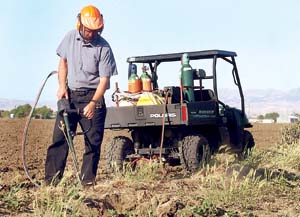
Local farmers and ranchers on Tuesday championed and won the
right to continue blowing up rodents that they say endanger their
crops.
Local farmers and ranchers on Tuesday championed and won the right to continue blowing up rodents that they say endanger their crops.
A dozen San Benito County landowners attended the Board of Supervisors meeting to oppose a proposal to restrict the use of shock waves that blast underground rodent holes. They argued the high-tech devices were efficient and environmentally friendly, and that complaints about noise and safety were unfounded.
“Farmers and ranchers need every single tool we can utilize to control pests on our properties,” San Juan Bautista orchard owner Anthony Botelho told the Board on behalf of the local Farm Bureau.
Supervisors unanimously agreed the law proposed by Supervisor Ruth Kesler – no use of such explosives on properties of 20 or fewer acres, or within 500 feet of inhabited structures – was too restrictive.
Supervisor Richard Scagliotti instead proposed that farmers give 24 hours notice to neighbors within 500 feet, without the proposed restriction on property sizes. And the Board agreed to direct the County Counsel’s Office to prepare a new ordinance that merely requires that condition.
Even Kesler, who proposed the ordinance after she received complaints from Aromas residents about the blasting, voted in favor of the motion.
Landowners in recent years have used two particular products – the Rodenator and the Rodex 4000. A mix of propane and oxygen creates an underground shock wave that kills gophers, squirrels and other rodents while collapsing their burrowing holes, according to a county report.
Historically, pest control has been a problem for farmers and ranchers. It’s one that often costs thousands of dollars – not only from crop damage, but also for eradication efforts. The underground detonators, landowners said, are a marked improvement over poisons used in the past that often seeped into the groundwater supply and polluted the local watershed.
Critics argue the sudden booms – with decibel levels comparable to that of a running tractor – scare farm animals and could lead to panicked horses throwing people to the ground.
Lone Tree Road residents Doug and Jan Padrick were the only two speakers in favor of the ordinance. They said the machines’ noises are too disruptive and they had collected 55 signatures from neighbors who agreed. Doug Padrick pleaded to the Board for a “more professional, responsible use of the machine.”
Before the Board’s decision to essentially reject the ordinance, many landowners argued against the proposed restrictions and said concerns about frightened animals were exaggerated.
Ray Perez uses the Rodenator on his property. He said his horses continue grazing, and his dogs just sit watching, during detonations.
“I don’t see horses spinning around or dogs barking or yelping,” Perez said.
Some landowners acknowledged the machines emit tremendous noises. But that’s one of many sacrifices of living in the country, said Pacines resident Jan Joseph.
“The reason I don’t complain about the noise is because I choose to live in an agricultural area,” he said.
Gopher Busters, Inc. is a local business that exterminates rodents using the devices. Owner Jack Kimmich said he detonates smaller blasts, as a warning, before the big ones.
And after three or four successive visits, most rodents are eradicated, he said. Though he may have to go back to some properties a few times a year.
Kimmich told Board members he would be glad to do a demonstration to show how the effectiveness of the machines.
“Yeah, bring one in,” Supervisor Bob Cruz replied, and was followed by laughter throughout the chambers.
Kollin Kosmicki can be reached at 637-5566, ext. 331 or at
kk*******@***********ws.com.








